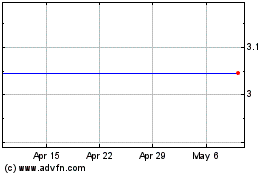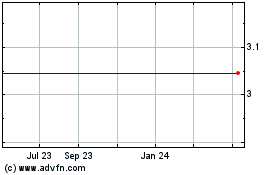Auris Medical Reports New Data Highlighting Superior Bioavailability of AM-125 Compared to Oral Betahistine
February 07 2018 - 9:11AM

- Single dose animal study demonstrates 5 to 35 times higher
bioavailability of intranasal betahistine relative to oral
betahistine
- Bioavailability of intranasal betahistine in humans estimated
to be 20 to 40 times higher relative to oral betahistine
Zug, Switzerland, February 7, 2018 - Auris
Medical Holding AG (NASDAQ: EARS), a clinical-stage company
dedicated to developing therapeutics that address important unmet
medical needs in neurotology, today reported new data on the
pharmacokinetics of AM-125, its investigational drug for the
intranasal treatment of vertigo. The results show markedly higher
blood plasma concentrations when betahistine administered
intranasally rather than orally. Oral betahistine is currently
marketed in about 115 countries world-wide and one of the most
frequently prescribed treatments for vestibular disorders.
Non-clinical pharmacokinetics
In a single-dose pharmacokinetic study in Beagle
dogs betahistine concentrations were determined in blood plasma
following intranasal administration of the compound at doses up to
120 mg, oral administration up to 48 mg/kg and intravenous
administration at 0.44 mg/kg. The absolute bioavailability reached
27 to 82% with intranasal betahistine and 2 to 6% with oral
betahistine. The relative bioavailability of intranasal betahistine
against oral betahistine was in a range of 5 to 35 times. Overall,
the pharmacokinetic profile of intranasal betahistine was similar
to the one of intravenous betahistine. The study results confirm
and complement those from an earlier single- and repeated-dose in a
smaller number of Beagle dogs. In both studies, intranasal
betahistine was well tolerated.
Human pharmacokinetics
Additional human pharmacokinetic data were
generated through the comparison of outcomes from an earlier single
dose Phase 1 clinical trial with intranasal betahistine up to 40 mg
with those from an independent Phase 1 clinical trial with oral
betahistine at 3 x 48 mg/day.[1] The relative bioavailability with
intranasal administration was 20-40 times higher than with oral
administration.
"We are very pleased to see the superior
bioavailability of intranasal betahistine confirmed further based
on animal and human study data," commented Thomas Meyer, Auris
Medical's founder, Chairman and Chief Executive Officer. "Although
oral betahistine in many cases is the drug of choice for treating
vestibular disorders, it is also well known that the drug is not
used most effectively with current standard oral doses due to its
rapid metabolization. We believe that the intranasal route offers
significant additional benefits in terms of efficacy and
tolerability. We plan to bring this new treatment option to
patients in key markets, including in the US where the compound
currently is not approved."
In a next step, Auris Medical is planning to
test intranasal betahistine in a second phase 1 clinical trial to
determine the maximum tolerated dose with single and repeated
dosing and to generate additional data on the relative
bioavailability compared to oral betahistine. The study is expected
to start enrolling healthy volunteers towards the end of the first
quarter of 2018; results are expected to become available by
mid-year.
About Auris Medical
Auris Medical is a Swiss biopharmaceutical
company dedicated to developing therapeutics that address important
unmet medical needs in neurotology. The company is focused on the
Phase 3 development of treatments for acute inner ear hearing loss
(AM-111) and for acute inner ear tinnitus (Keyzilen®; AM-101) by
way of intratympanic administration with biocompatible gel
formulations. In addition, Auris Medical is developing intranasal
betahistine for the treatment of vertigo (AM-125) as well as
early-stage research and development projects. The Company was
founded in 2003 and is headquartered in Zug, Switzerland. The
shares of Auris Medical Holding AG trade on the NASDAQ Capital
Market under the symbol "EARS."
Forward-looking Statements
This press release may contain statements that
constitute "forward-looking statements" within the meaning of
Section 27A of the Securities Act of 1933 and Section 21E of the
Securities Exchange Act of 1934. Forward-looking statements are
statements other than historical fact and may include statements
that address future operating, financial or business performance or
Auris Medical's strategies or expectations. In some cases, you can
identify these statements by forward-looking words such as "may,"
"might," "will," "should," "expects," "plans," "anticipates,"
"believes," "estimates," "predicts," "projects," "potential,"
"outlook" or "continue," and other comparable terminology.
Forward-looking statements are based on management's current
expectations and beliefs and involve significant risks and
uncertainties that could cause actual results, developments and
business decisions to differ materially from those contemplated by
these statements. These risks and uncertainties include, but are
not limited to, Auris Medical's need for and ability to raise
substantial additional funding to continue the development of its
product candidates, the timing and conduct of clinical trials of
Auris Medical's product candidates, including the likelihood that
the TACTT3 clinical trial with Keyzilen® will not meet its
endpoints , the clinical utility of Auris Medical's product
candidates, the timing or likelihood of regulatory filings and
approvals, Auris Medical's intellectual property position and Auris
Medical's financial position, including the impact of any future
acquisitions, dispositions, partnerships, license transactions or
changes to Auris Medical's capital structure, including future
securities offerings. These risks and uncertainties also include,
but are not limited to, those described under the caption "Risk
Factors" in Auris Medical's Annual Report on Form 20-F and future
filings with the Securities and Exchange Commission.
Forward-looking statements speak only as of the date they are made,
and Auris Medical does not undertake any obligation to update them
in light of new information, future developments or otherwise,
except as may be required under applicable law. All forward-looking
statements are qualified in their entirety by this cautionary
statement.
Investor contact: Daniel Ferry, LifeSci Advisors, LLC,
1-617-535-7746, investors@aurismedical.com
[1] The overall design of that trial are described in Barak et
al. (2016), Journal of Psychopharmacology 30(3): 237-241. The
maximum approved total daily oral dose for betahistine is 48
mg.
Auris Medical (NASDAQ:EARS)
Historical Stock Chart
From Oct 2024 to Nov 2024

Auris Medical (NASDAQ:EARS)
Historical Stock Chart
From Nov 2023 to Nov 2024
